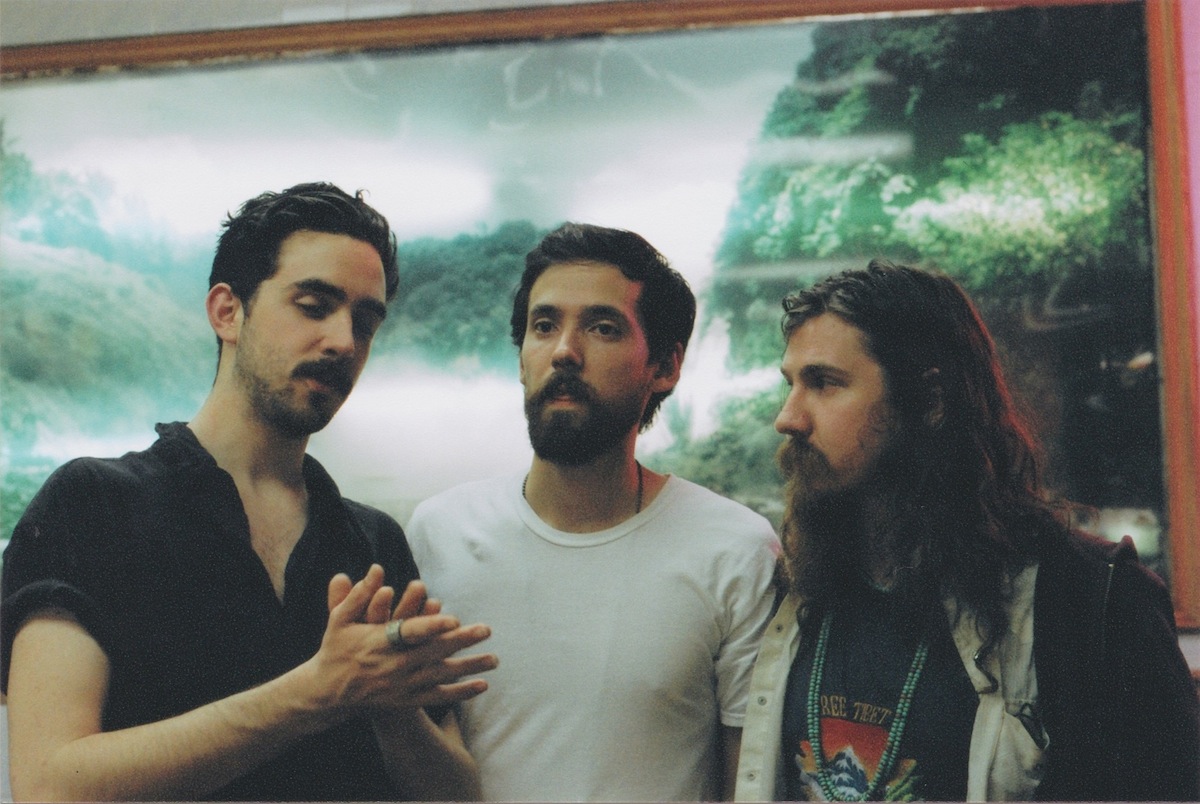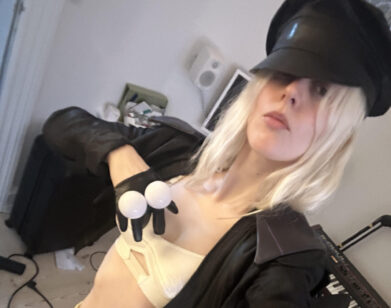Exclusive Album Premiere and Interview: ‘Random Nostalgia,’ Rivergazer

ABOVE: RIVERGAZER. PHOTO COURTESY OF HEATHER CRAIG.
Kevin Farrant will soon be without a permanent address. For the first time since he started playing music with his friends as a kid, his band, Porches., will be touring hard enough that he doesn’t have to worry about pinning down a new lease until November. Farrant plays lead guitar in the indie-pop group helmed by New York’s Aaron Maine, but this summer is an exciting one for another reason, too: He’s debuting his first record with Rivergazer, a rock project that lets him turn the spotlight on his own songwriting.
Random Nostalgia, Rivergazer’s forthcoming record due out next week on Father/Daughter Records, makes big swings between humor and deep melancholy. It’s got a Silver Jews swing to it, complete with David Berman’s deadpan verse, but amps up the psychedelic strokes—Americana with a hint of acid. It’s also a document of Farrant coming to believe in songs he’d pegged for the scrap heap, as well as in himself as a songwriter. He describes it as something of a coming of age.
Farrant took the time to speak with us from the road while on tour with Porches., and we’re pleased to premiere Random Nostalgia in its entirety, too.
SASHA GEFFEN: Where are you right now?
KEVIN FARRANT: We’re somewhere south of New York. Oneida country.
GEFFEN: Where are you headed?
FARRANT: Today is a day off, so we’re just headed to our drummer Cameron’s mom’s house.
GEFFEN: What can you see around you?
FARRANT: A big old highway, Interstate 90, and then there’s… it looks like a big brick house, but it’s just the service area with a Starbucks inside. Literally, the whole place smells like shit. It’s like somebody took a crap in the parking lot, but everywhere. There’s got to be a farm somewhere.
GEFFEN: Well, thank you for braving these tough conditions.
FARRANT: It’s all good.
GEFFEN: So this is your first album as Rivergazer?
FARRANT: Yeah, this is the first studio thing for me. I wrote all the songs, but the album wouldn’t exist without Kolson Pickard, my best friend from childhood. Nor would it exist without Hunter Davidsohn, the guy who recorded and produced it. It’s my brainchild, but it wouldn’t have taken the full form that it did without Kolson and Hunter. It was a really amazing process to work with three people.
GEFFEN: Is this your first time recording with this amount of production?
FARRANT: Yeah. Everything else was home recording, Garage Band or Logic demos that I would do on my own, or using my iPhone to record little demos. I had done some recording on the Porches. record Slow Dance in the Cosmos just playing guitar, so I had met Hunter and been in the studio with him. We really got along, so as soon as I had started amassing a certain number of songs that I believed in enough, I was like, I really want to make a full-length album and I want to give these songs a chance to take on a larger life of their own. I decided to go up there with Kolson. It worked out. We all worked really well together.
GEFFEN: How did building your songs up change the way that you think about your music?
FARRANT: It’s so funny when you write a song and you think it’s a joke song. Songs are going to come out anyway and they’re going to be simple demos or a raw version of some emotional thing that I’m trying to express. And then there’s stuff like “Safari Jack.” To me, I made this song like, isn’t it so silly? I thought it was just a joke, and then I showed it to Hunter when we were up there, and he was like, “No, let’s record that now.” I was like, “Oh, okay!” I thought it was bad. Then it turned out to be awesome. It worked out in the studio really well. It was so much fun to make that track. So that was surprising.
GEFFEN: This record is called Random Nostalgia. Are you referring to a kind of musical nostalgia for albums from your past?
FARRANT: No, it’s more about the kid version of myself and all my friends. Just a collective transition out of the small town that we grew up in. “Random Nostalgia” was the first song that I had written where I thought, Okay, I’m going to make more songs and I’m going to make an album. I wrote the song after driving around town seeing Christmas lights go up again, but then the song goes, “I’ll be in the bathroom throwing up.” I’m not a kid anymore in the sense that Christmas and all the clichéd things that you look forward to as a child have totally lost their appeal. Everyone’s parents are divorced, everyone’s just moving on. It’s not a bad thing. Now I’m 26, and I feel very different from the time that some of these songs were written, but it’s nice how it’s all come together. This record as a piece encapsulates that moment in my life, that transition. All this stuff is over and it’s time to move to the next chapter, whatever that is.
GEFFEN: Obviously you have a lot of fond memories of the place where you grew up, but then there are the cracks that start to form in them. How do you reconcile the good memories with moving on?
FARRANT: I think it’s always come down to the emotional, poetic thing that I’m trying to get across. It’s got to come out in some way for me. I can’t keep it in. It’s like a therapy. It’s therapy to write a song and then feel proud of it. After the fact I feel better about it, even if the song is talking about something sad or melancholy. I think a lot of artists or songwriters probably feel the same way. For a moment afterwards, you’re like, yeah, cool. It helps to fight against the nothingness for that moment.
GEFFEN: Where did you grow up?
FARRANT: I was born in London, but we moved after three years. I grew up in Pleasantville, New York, which is 40 minutes north of New York City. Everybody knows each other there. It’s lower- to middle-class people. We were next to a lot of richer towns. You’ve got to hope to find people that you get along with, and I was lucky enough to find a great, small group of friends that were all artists or musicians. To this day, that group of people is still doing the same thing. Aaron [Maine, of Porches.] and I grew up down the street from each other. Kolson grew up a mile away. We could walk to each other’s houses.
GEFFEN: You’ve been playing with Porches. since its inception, then.
FARRANT: Yeah. After I finished school at Pratt, I came home for the summer. Aaron was in his basement writing songs nonstop. He showed me “Airport Terminal.” I was like, “Aaah, this is so good!” Then our friend Oliver Hill was having a house show and so Aaron taught me the guitar part, and then for the show I played guitar and Aaron just sang with the microphone and we had an iPod play the backing track. That was kind of the first Porches. show. It was really cool.
GEFFEN: How has working with Aaron informed your own songwriting?
FARRANT: It’s been amazing. I hadn’t gone on tour or played in a band seriously since I was 19. When I was at school at Pratt in Brooklyn, I stopped playing in bands for two or three years. Working with Aaron in the band and doing all the tours has really given me confidence and shown me that I could and should believe in myself, as everyone should. I think that’s the most stellar thing that I’ve seen from Aaron. He’s not going to compromise on the art. I think that’s the right attitude to have as a musician. You have to believe in yourself, which is cliché, but you have to just go for it. Seeing other bands across the country doing that, meeting such a great network of people that are in the same boat doing the same exact thing because they know that this is what makes them happiest in the world, it’s such a treat to have that, because I know so many people struggle with what they want to be. It’s been nice to totally embrace the pursuit of a musical career because it’s really the only thing that I feel happiest doing. I’m feeling like there’s nothing else that I could really do.
RANDOM NOSTALGIA IS OUT NEXT TUESDAY, AUGUST 12, ON FATHER/DAUGHTER RECORDS. FOR MORE ON RIVERGAZER, PLEASE VISIT ITS FACEBOOK PAGE.






